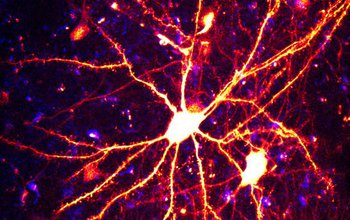News Release 14-099
NSF awards $10.8 million in early concept grants for brain research
36 new awards as part of NSF’s support for The BRAIN Initiative and potentially transformative insights into understanding the brain

New neurotechnologies can help researchers answer fundamental questions about how the brain works.
August 18, 2014
This material is available primarily for archival purposes. Telephone numbers or other contact information may be out of date; please see current contact information at media contacts.
The National Science Foundation (NSF) has awarded 36 Early Concept Grants for Exploratory Research (EAGER) to enable new technologies to better understand how complex behaviors emerge from the activity of brain circuits.
These awards will contribute to NSF's growing portfolio of investments in support of President Obama's BRAIN Initiative, a multi-agency research effort that seeks to accelerate the development of new neurotechnologies that promise to help researchers answer fundamental questions about how the brain works.
Each NSF EAGER award is for $300,000 over a two-year period. The researchers receiving the awards, many first-time NSF grantees, will develop a range of conceptual and physical tools, from real-time whole brain imaging, to new theories of neural networks, to next-generation optogenetics.
Most of the awarded projects involve interdisciplinary teams of investigators; these 36 awards will support 76 researchers with expertise that spans nearly all scientific and engineering fields of study represented at NSF. Three of the projects involve international collaborations.
"Progress towards the goals of The BRAIN Initiative and our comprehension of the brain and behavior requires that scientists and engineers from diverse disciplines work together," said NSF Director France Córdova. "NSF is proud to invest in collaborative, fundamental projects that incubate innovative ideas in this exciting area of inquiry."
Catching the brain in action
In March, NSF asked researchers to submit ideas for early-stage, potentially ground-breaking new approaches to reveal how neuronal processes in the brain lead to complex behaviors in any organism. NSF reviewed the summaries and invited full proposals from applicants whose ideas best aligned with the outlined research topics. Five of NSF's scientific directorates were involved in funding the final selections.EAGER awards, a funding mechanism within NSF's merit review system, are intended for short-term, proof-of-concept projects with high-payoff prospects.
"These new awards are a key element in NSF's overall, strategic efforts to support investigations into how the brain functions, in action and in context," said John Wingfield, NSF's assistant director for the Biological Sciences Directorate, which led the call for proposals.
"The research community is well-poised to tackle the challenges associated with understanding neural circuitry," Wingfield said. "With NSF's support, we expect these investments to lead to significant steps toward inventive new tools and technologies aimed at catching the brain in action."
These EAGER awards cap off numerous NSF-supported, BRAIN-related activities in fiscal year 2014. These activities include a series of workshops sponsored by multiple scientific directorates, the new MIT-based Science and Technology Center for Brains, Minds and Machines, and ongoing awards from core programs across the foundation.
Visit NSF.gov/brain for more information about NSF's support for The BRAIN Initiative.
The full list of primary investigators who will receive EAGER awards follows.
Directorate for Biological Sciences
Florin Albeanu, Cold Spring Harbor Laboratory
Dora Angelaki, Baylor College of Medicine
Brenda Bloodgood, University of California, San Diego
Davide Comoletti, Rutgers
Stephen Cowen, University of Arizona
Steven Finkbeiner, University of California, San Francisco
Martha Gillette, University of Illinois at Urbana-Champaign
Ehud Isacoff, University of California, Berkeley
Hiro Matsunami, Duke University
Karen Mesce, University of Minnesota
Ethan Minot, Oregon State University
Partha Mitra, Cold Spring Harbor Laboratory
Mala Murthy, Princeton University
Carey Priebe, Johns Hopkins University
Todd Roberts, University of Texas, Southwestern
Aravi Samuel, Harvard University
Spencer Smith, University of North Carolina
Fidel Santamaria, University of Texas, San Antonio
Mriganka Sur, MIT
Martin Usrey, University of California, Davis
Matt Wachowiak, University of Utah
Edo Waks, University of Maryland
Donna Webb, Vanderbilt University
Ian Wickersham, MIT
Karen Zito, University of California, Davis
Stephen Boppart, University of Illinois, Urbana-Champaign
Bin He, University of Minnesota
Ute Hochgeschwender, Duke University
Nancy X. Xu, Old Dominion University
Directorate for Computer and Information Science and Engineering
Katherine Heller, Duke University
Directorate for Social, Behavioral and Economic Sciences
Andrea Chiba, University of California, San Diego
Catherine Stamoulis, Harvard Medical School
Directorate for Mathematical and Physical Sciences
William Bialek, Princeton University
David Kleinfeld, University of California, San Diego
Scott Laughlin, Stony Brook University
Charles Stevens, Salk Institute for Biological Studies
-NSF-
Media Contacts
Sarah Bates, NSF, (703) 292-7738, email: sabates@nsf.gov
Lily Whiteman, NSF, (703) 292-8070, email: lwhitema@nsf.gov
Related Websites
Understanding the Brain website: http://www.nsf.gov/brain
NSF BRAIN Initiative YouTube channel: https://www.youtube.com/user/NSFbraininitiative
White House BRAIN Fact Sheet: http://www.whitehouse.gov/the-press-office/2013/04/02/fact-sheet-brain-initiative
NIH BRAIN website: http://www.nih.gov/science/brain/
The U.S. National Science Foundation propels the nation forward by advancing fundamental research in all fields of science and engineering. NSF supports research and people by providing facilities, instruments and funding to support their ingenuity and sustain the U.S. as a global leader in research and innovation. With a fiscal year 2023 budget of $9.5 billion, NSF funds reach all 50 states through grants to nearly 2,000 colleges, universities and institutions. Each year, NSF receives more than 40,000 competitive proposals and makes about 11,000 new awards. Those awards include support for cooperative research with industry, Arctic and Antarctic research and operations, and U.S. participation in international scientific efforts.
Connect with us online
NSF website: nsf.gov
NSF News: nsf.gov/news
For News Media: nsf.gov/news/newsroom
Statistics: nsf.gov/statistics/
Awards database: nsf.gov/awardsearch/
Follow us on social
Twitter: twitter.com/NSF
Facebook: facebook.com/US.NSF
Instagram: instagram.com/nsfgov


